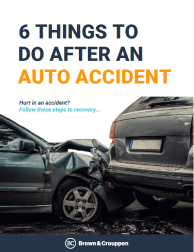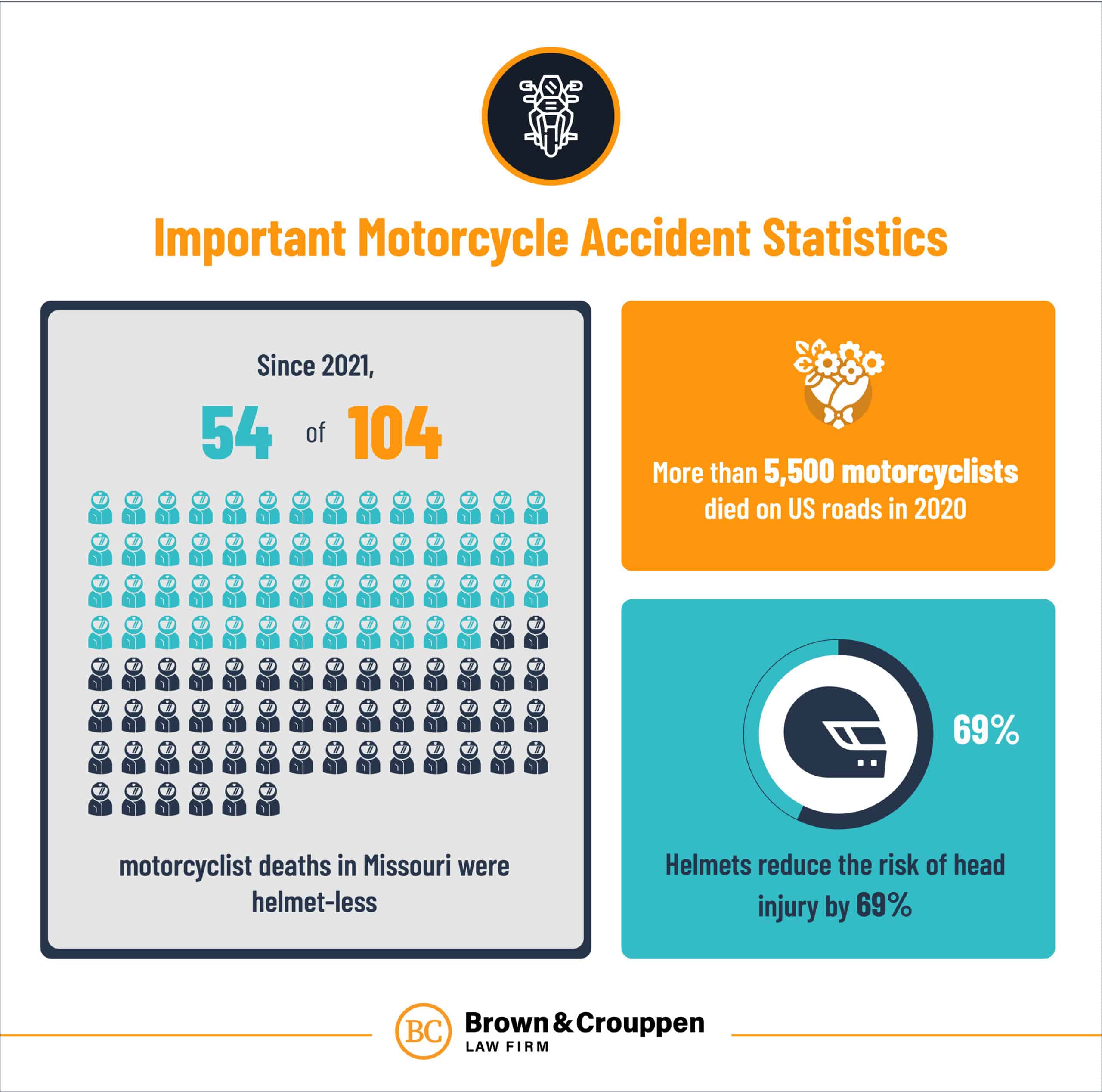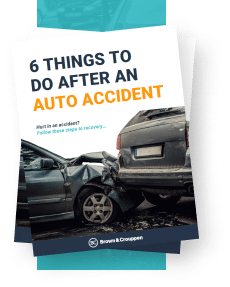ADDITIONAL INFO ABOUT HELMET LAWS IN MISSOURI
In 1967, Missouri enacted a universal helmet law which required every single person operating a motorcycle or riding as a passenger to wear a helmet when traveling on Missouri highways. However, on August 28, 2020, the more relaxed Missouri helmet law went into effect as outlined below.


AUTO ACCIDENT
CHECKLIST
RSMo. 302.020(2) – Also known as the Missouri Helmet Law, provides that the following individuals must wear protective headgear at all times when the vehicle is in motion upon any Missouri highway:
- Every individual under the age of 26, who is operating or riding as a passenger on any motorcycle or motor-tricycle.
- Every individual operating any motorcycle or motor-tricycle who has only been issued an instruction permit regardless of their age.
The Missouri Department of Transportation has certain requirements about what motorcycle helmets should look and feel like to maximize protection. Safe helmets should weigh about three pounds and be one inch thick with a foam liner, sturdy chin straps and solid rivets. It should also be noted that motorcycle helmets that meet the qualifications have a DOT label on the back.
RSMo. 301.010 – Defines what vehicles are subject to the helmet law in Missouri. A “motorcycle” is defined as a motor vehicle operated on two wheels and a “motor-tricycle” is a motor vehicle upon which the operator straddles or sits astride that is designed to be controlled by handlebars and is operated on three wheels, including a motorcycle while operated with any conveyance, temporary or otherwise, requiring the use of a third wheel, but excluding an electric bicycle. Thus, motorized bicycles and all-terrain vehicles are not subject to helmet law requirements.
RSMo. 302.026 – Provides operators and passengers older than 26 need not wear a helmet if they are covered by a health insurance policy or another form of insurance that will provide the person with medical benefits for injuries incurred as a result of an accident while operating or riding on a motorcycle or motor-tricycle. In other words, operators and passengers older than 26 are not required by law to wear a helmet if they have health insurance.
HOW MISSOURI’S HELMET LAW IS ENFORCED
Missouri’s helmet law also states that “No person shall be stopped, inspected, or detained solely to determine compliance with this subsection.” This means police officers and highway patrol troopers cannot pull someone over solely because they are not wearing a helmet. Instead, officers can only issue a citation for failing to wear a helmet once they’ve stopped a motorcyclist for another traffic violation.
For example, if a motorcyclist is stopped for infractions like exceeding the speed limit, failing to yield, or a broken taillight, the officer can write a ticket for failing to wear a helmet if the motorcyclist is younger than 26 or driving with only an instruction permit. At that point, officers may require operators or passengers to show proof of health insurance which entitles them to ride without a helmet. Additionally, the law provides that the Missouri Department of Motor Vehicles cannot add points to your driving record for a helmet law violation, but a judge can punish a violation by imposing a fine. For a first-time offense, the fine may not exceed $25.
The result of these relaxed laws is that little is done to ensure compliance and enforcement is minimal. Law enforcement officers cannot determine a motorcyclist’s age, licensing status, or health insurance status without stopping them for another traffic violation. Despite the lack of enforcement, wearing a helmet is still of utmost importance when riding a motorcycle. Numerous safety and legal considerations are discussed below.
MISSOURI HELMET LAW SAFTEY CONSIDERATIONS
Regardless of how relaxed Missouri’s helmet laws are enforced, helmets save lives. As of September 2021, the Missouri Department of Transportation reported 104 motorcyclist fatalities and 54 of those riders were not wearing helmets. Just 5 out of the 82 fatalities MoDOT recorded in 2020 were motorcyclists without helmets, so fatalities in 2021 were nearly 10 times more than what was recorded in 2020. And in July 2022, a motorcyclist traveling north on I-170 in St. Louis, who was not wearing a helmet, died after totaling his motorcycle when he lost control and hit the guardrail.
The CDC reports that more than 5,500 motorcyclists died on our nation’s roads in 2020, and more than 180,000 were treated in emergency departments for crash injuries. Helmets reduce the risk of head injury by 69%. Riding a motorcycle without a helmet increases your risk of death, traumatic brain injury, and medical costs associated with lifelong symptoms that accompany traumatic brain injuries such as concussions. Even if you have health insurance in compliance with Missouri law, head injuries can result in permanent disabilities.

HOW WEARING A MOTORCYCLE HELMET CAN AFFECT INJURY CLAIMS
Missouri is a comparative fault state. This means if you contributed to your injuries, the amount of money you can recover for those injuries may be reduced. For example, if your personal injury claim is litigated and proceeds to a jury trial, the jury may be asked to consider what percentage of the accident was your fault. If a jury finds you 25% at fault for your injuries, you will only be awarded 75% of your damages. For cases that do not go to court, the decision to wear a helmet may impact your settlement amount depending on various factors.
If you operate a motorcycle or ride as a passenger, a jury may perceive your decision to ride without a helmet negatively. Some might consider it reckless to consciously disregard a risk to your own safety and others might consider how a motorcycle helmet could have prevented your injuries or reduced their severity.
Additionally, the at-fault driver in a motorcycle accident will highly emphasize your decision to forego wearing a helmet in order to avoid liability for the accident altogether. In any case, wearing a motorcycle helmet is always the best decision.
GET HELP WITH A MISSOURI MOTORCYCLE ACCIDENT CLAIM FROM BROWN & CROUPPEN LAW FIRM
At Brown & Crouppen law firm, we represent victims of motorcycle accidents in the state of Missouri. Our Kansas City and St. Louis motorcycle accident attorneys represent those who have suffered injuries as a result of an accident. Missouri motorcyclists who have been injured may be eligible to pursue compensation for damages including pain and suffering, medical bills, and property damage.
Getting started with your case is easy. Call 888-801-4736 or request a free case evaluation from our legal team.


